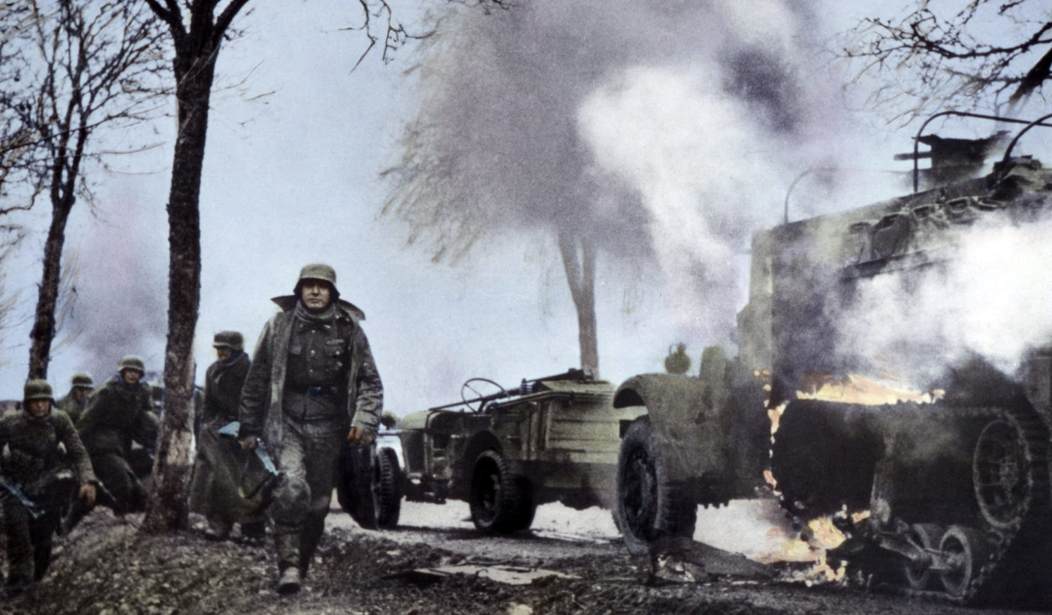Time travel scenarios make good starting points for fictional storylines. What if Hitler were to possess Putin’s body in 2016? What if Obama were president during the Battle of the Bulge.
Those looking for a good book to read on the Bulge may wish to try Peter Caddick-Adams’ Snow and Steel. While most everyone has some passing familiarity with that gigantic battle in 1944-45, Caddick-Adams’ (CA for short) encyclopedic knowledge, professional qualifications and lively writing style make this vast canvas more accessible in its essentials than many older accounts.
Of particular interest is CA’s description of the offensive’s genesis. He convincingly shows that the idea of a “Decision in the West” had been growing in Hitler’s mind ever since the Normandy collapse ended in a breakout and pursuit which finished up on the German border. Hitler had to retrieve the situation, but how? The key to understanding what happened next is to realize that Hitler thought in terms of grand strategy — a combination of military, political, economic and demographic objectives.
Hitler had license to “think out of the box”, which while normally useful was dangerous in a person who was both irrational and mad. The terms “irrationality” and “madness” are not necessarily synonymous. In Hitler’s case, they were actually separable attributes. Hitler’s irrationality was expressed in his inability to accept facts. In 1944 he was psychologically unable to accept that the available resources would never suffice to reach Antwerp.
By contrast Hitler’s madness manifested itself — for lack of a better word — in the monstrosity of his aims. It was reflected in the character of his universe. Richard Dawkins’ recent press interview perhaps best illuminates this distinction. The famous atheist, who once described himself as a “secular Christian” believed that Christianity was irrational but not mad. By contrast Dawkins felt that radical Islamism, while often highly rational in an operational sense, was nevertheless completely mad, and dreaded its advances in a non-Christian West. He said:
“There are no Christians, as far as I know, blowing up buildings,” Dawkins said in an interview with The Times of London in April 2010 on the issue of Islamist terrorism. “I am not aware of any Christian suicide bombers. I am not aware of any major Christian denomination that believes the penalty for apostasy is death,” he added.
The prominent atheist went on to say, “I have mixed feelings about the decline of Christianity, in so far as Christianity might be a bulwark against something worse.”
This captures it exactly. Serial killers are often quite calculating –rational — but are nevertheless totally mad. Now in the fall of 1944 Adolf Hitler was both irrational and mad. Operation Autumn Mist, as the Ardennes offensive was codenamed, was defective because it was irrational, and consequently imposed over the objections of Germany’s professional strategists. It was never a serious plan for victory, merely a gamble, like the last fling of a bankrupt who spends all his remaining savings on Powerball tickets than an actual business plan.
Hitler could try it because he was mad; since he gave himself license to think in terms other than practical effects. Effects which held existed in the universe of National Socialist ideology. By staking the life of his nation — and his own — on these effects, he proved not only irrational but crazy.
Snow and Steel highlights two major historical lessons from the Battle of the Bulge which are relevant even today. The first is that victory is cumulative. The second was that strategy had to be communicated to subordinates in order to succeed.
From the beginning, as Caddick-Adams shows, Hitler regarded history as a struggle of “will”. If he could break Roosevelt’s will in the Ardennes, he reasoned that he could win the war. In his magical world matter didn’t count as much as psychology. By contrast, the US perhaps less ideologically, saw the conflict as a process of cumulation. If you killed enough Germans, fired enough artillery, took enough ground, you won. The book’s battle narratives validate the arithmetical theory of victory in horrifying detail. The US Army was simply too powerful, too mobile — and at nearly every level too competent — for Operation Autumn Mist to have any chance.
The second point was that strategy had to be communicated to be effective. To Roosevelt strategy was embodied in national consensus. To Hitler, strategy was a secret. Consequently he held every card too close to his chest. Stung by the July 20 assassination plot, the dictator trusted no one. Remaining inside a cordon sanitaire he wrapped orders in layer after layer of disinformation until, as CA shows, the very secrecy of Autumn Mist ensured supplies were too far back; assumptions went unchallenged and senior commanders remained unfamiliar with their tasks until almost the hour of attack. Hitler kept it so secret everybody was surprised — including the German commanders charged with leading major formations.
But his most serious mistake was to assume Roosevelt was like him. In fact FDR left the Bulge to Eisenhower, who in turn devolved command authority to his subordinate commanders. The very substance of AH’s assumptions were wrong. As it unfolded, the Battle of the Bulge was a contest not only between two sides but two styles; between a micromanaged, inflexible offensive and a creative, dynamic defensive.
SHAEF’s biggest advantage lay in that everybody could contribute. Instead of spending weeks lobbying Washington to craft a counterattack, Eisenhower simply accepted other commanders’ ideas. George Patton’s Third Army staff had not only anticipated Autumn Mist in general terms, but had actually planned contingency counterattacks. Rather than flying into a rage as Hitler would have done, Ike simply gave it a go-ahead. Thus, Hitler had only the initial advantage of surprise, but Eisenhower was inside his OODA loop thereafter.
One of history’s great ironies is that this winning system of delegation would be transformed within a few decades to the highly controlled, incredibly politicized approach of Vietnam. Lyndon Johnson, said Robert Caro , “liked to pick bombing targets himself. ” He famously boasted “those boys can’t hit an outhouse without my permission”.
The Lyndon Johnson system has carried over to Barack Obama. David Rohde and Warren Strobel, writing in the Atlantic, described in late 2014 how “Syria overwhelmed an overcentralized White House”. All three of Barack Obama’s former defense secretaries, Robert Gates, Leon Panetta and Chuck Hagel take up the same theme, complaining bitterly in public about the president’s compulsion to micromanage defense.
Like the doomed loser of the Battle of the Bulge, Obama does not seem to believe in arithmetic. He believes in drama. In historical pivots. The Iranian “nuclear deal” is being heralded in the rapturous style of a game changer. Obama may arithmetically be everywhere on the retreat. Iran is $150 billion richer, ISIS a little bigger, Syria a little more wrecked, Europe a little more overwhelmed. But none of this matter if the administration can create a ‘new atmosphere’. Newsweek writes that American contingency planners preparing for a Russian invasion of the Baltics note “that there are fewer U.S. forces in Europe today than there are policemen in New York City.” But this won’t really matter, if Obama can make the sympathetic connection.
Eli Lake at the Chicago Tribune describes the price for these magic moments. ISIS outhouses are off limits in Afghanistan. “There are real restrictions about what they can do against the ISIS presence in Afghanistan,” according to Mac Thornberry, the chairman of the House Armed Services Committee.
Thornberry said that the rules of engagement, combined with what he called micro-management from the White House, have led military officers to tell him they have to go through several unnecessary and burdensome hoops before firing at the enemy.
“My understanding is it’s a very confused, elaborate set of requirements,” Thornberry said. “I think the effect of going through all of that makes it harder for our people to conduct their missions.”
He would not get into specifics about the rules, saying, “If the public were able to know all the restrictions placed on our troops, they would be unhappy about it, and if the enemy knew this they would have more of a leg up than they do now.”
Perhaps even more striking is an article in the Washington Post by David Petraeus, who essentially confirms what Thornberry says. “At present, U.S. and NATO airpower in Afghanistan is used only to attack validated al-Qaeda targets, to counter specific individuals or groups who have attacked coalition forces previously and to respond directly to attacks on coalition forces. According to leaders on the ground, U.S. and NATO forces are otherwise not allowed to attack Taliban targets. The situation appears to be in flux in regard to Islamic State elements, but through 2015, they too could be targeted only under narrow circumstances.”
You can’t bomb them too hard if you’re going to negotiate with them. In many ways the Obama administration’s style is the very opposite of FDR’s winning method in WW2. Where FDR was strategically clear and operationally flexible, Obama is strategically secretive and operationally overcontrolling.
Obama has launched his great offensive in the Middle East. He has his deal with Iran. Will it, even now, turn the tide of the last seven years? What has saved the administration till now is the overpowering might of the US military but if President Obama were ever to be challenged by a near peer competitor he would be in trouble very quickly.
“What if Hitler were to possess Putin’s body in 2016? What if Obama were president during the Battle of the Bulge.” Makes a good story right? Can you write the book? It will have to be science fiction because the former is unlikely and the latter is, as far as we know, impossible.
Follow Wretchard on Twitter
Recently purchased by readers:
Farther Than Any Man: The Rise and Fall of Captain James Cook, This is the true story of a legendary man and explorer, Captain James Cook. Author Martin Dugard uses Capt. Cook’s personal journals and portrays his tremendous ambition, intellect, and sheer hardheadedness to rise through the ranks of the Royal Navy and become one of the most enduring figures in naval history.
Bad Religion: How We Became a Nation of Heretics, Described by reviewers as thought-provoking, scholarly, and inspiring, this book by Ross Douthat offers an account of how American Christianity has lost its way — and why it threatens to take American society with it.
The Quartet: Orchestrating the Second American Revolution, 1783-1789, From Pulitzer Prize–winning American historian Joseph J. Ellis, the unexpected story of why the thirteen colonies, having just fought off the imposition of a distant centralized governing power, would decide to subordinate themselves anew.
Did you know that you can purchase some of these books and pamphlets by Richard Fernandez and share them with your friends? They will receive a link in their email and it will automatically give them access to a Kindle reader on their smartphone, computer or even as a web-readable document.
The War of the Words, Understanding the crisis of the early 21st century in terms of information corruption in the financial, security and political spheres
Rebranding Christianity, or why the truth shall make you free
The Three Conjectures, reflections on terrorism and the nuclear age
Storming the Castle, why government should get small
No Way In at Amazon Kindle. Fiction. A flight into peril, flashbacks to underground action.
Storm Over the South China Sea, how China is restarting history in the Pacific
Tip Jar or Subscribe or Unsubscribe to the Belmont Club










Join the conversation as a VIP Member